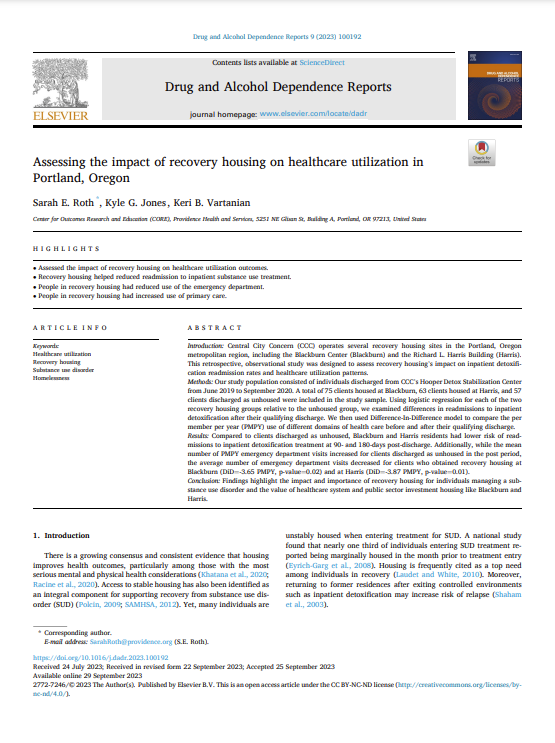Headline
Use of recovery housing that offer co-located physical and mental health services leads to decreases in readmission and emergency department (ED) visits among individuals recovering from substance use disorder (SUD), as well as increased use of primary care.
Context
There is a substantial body of evidence indicating that stable housing improves health outcomes, especially among those recovering from SUD. Central City Concern (CCC), a nonprofit organization based in Portland, Oregon, offers transition support services to people experiencing homelessness. CCC operates multiple recovery housing sites for individuals discharged from CCC’s inpatient detoxification and stabilization centers. These sites provide residents access to an onsite federally qualified health center, along with wraparound mental health and recovery services.
Findings
This study compares outcomes for 138 individuals discharged from CCC's detoxification and stabilization center and receiving follow up care from one of two recovery housing sites and a comparison group of 57 individuals experiencing homelessness who were not referred to recovery housing.
When controlling for age, medical complexity, and discharge month, those discharged to recovery housing exhibited a significantly lower likelihood of readmission to inpatient detoxification treatment at 90- and 180-days post-discharge. Recovery housing discharges also exhibited a decrease in ED visits in the 12 months post-discharge (3.68 to 3.06 and 3.27 to 2.44 across the two sites), while individuals discharged without stable housing experienced a significant increase (3.56 to 6.59). Similarly, inpatient stays increased for those discharged without housing, but decreased for those in recovery housing. The average number of primary care visits remained the same for individuals discharged without housing, but increased significantly for those discharged to recovery housing (2.87 to 6.33 and 2.38 to 5.18). No meaningful differences across the two populations were identified for outpatient mental health, specialty care, or dental care service use.
Takeaways
This study contributes to the growing body of evidence indicating a significant relationship between housing stability and improved health outcomes, particularly for individuals with complex health needs, such as SUD. It specifically highlights the positive impact of recovery housing models that provide integrated and wraparound physical, behavioral, and social care services. The increased use of primary care and decreased use of acute care services by individuals discharged to recovery housing demonstrated in this study may offer valuable insights for health care stakeholders seeking to expand access to similar programs.

